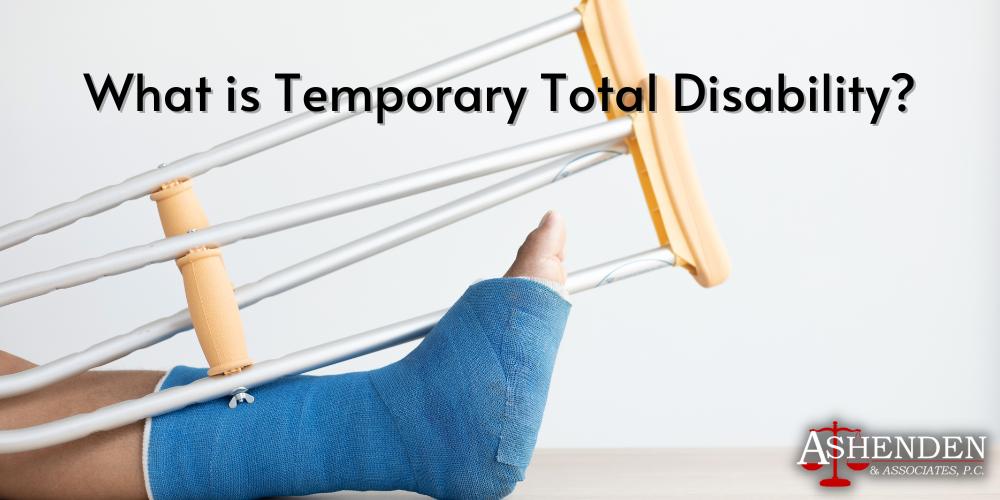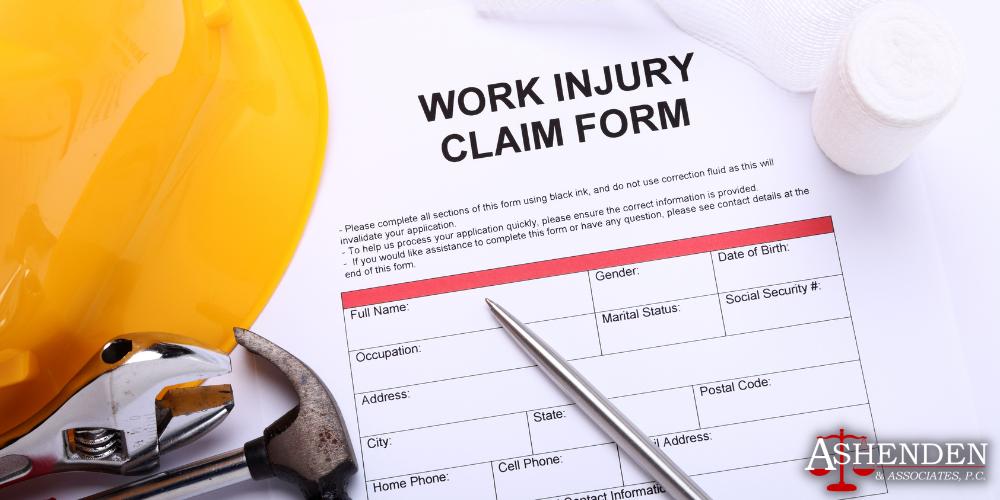
If you have suffered a work related injury or illness that requires you to recover at home for more than a week or two, you may find yourself worrying about your financial situation, especially if you’re out of PTO days and you have a family to support. You may decide that the best solution to keep your finances out of the red and your family fed is to apply for workers’ comp benefits. From there, workers’ compensation law requires all injured workers to seek medical care and a disability rating from a doctor. There are four main disability ratings, one being temporary total disability (TTD). Below, our legal team explains everything you need to know about receiving temporary total disability benefits after a work injury or illness.
If you have suffered an injury or illness at work, you may be eligible for workers’ compensation benefits in the state of Georgia. Sandy Springs work injury lawyers at Ashenden & Associates can carefully analyze the details of your situation, protect your legal rights, and help you receive the maximum amount of benefits you deserve. Call 770-394-8909 to schedule a free consultation with our law firm today.
What is Temporary Total Disability?
Temporary total disability (TTD) is one of many disability ratings that you can receive from a doctor after suffering a work-related injury. The temporary total disability rating means that a worker is totally disabled for a short amount of time.
Injured workers typically receive a disability rating after their doctor has determined that they have reached maximum medical improvement (MMI), which means that the worker has either completely healed from their injury or they have reached a point in their recovery process in which further medical treatment will not improve their condition.
A disability rating may affect the amount and duration of workers’ compensation benefits you receive.
Other Disability Ratings
Other disability ratings include:
- Temporary Partial Disability (TPD) means that an employee is partially disabled for a temporary amount of time. A common example would be one or two broken bones in the arm(s), which would prevent someone from lifting objects as part of their job.
- Permanent Total Disability (PTD) means that an employee has suffered a complete, permanent disability. A common example would be a spinal cord injury that causes paralysis from the neck down. This is irreversible, and the person is completely incapable of doing anything on their own for the rest of their life, including working at a job. If you’ve sustained such an injury, contact our Sandy Springs spinal cord injury lawyers for a free consultation.
- Permanent Partial Disability (PPD) means that an employee will be partially disabled for the rest of their life. A common example would be a spinal cord injury that causes paralysis from the waist down. People with permanent disabilities like this would still be able to care for themselves with assistive equipment and even work, as long as their job only includes tasks that can be completed from the waist up.

What Are Temporary Total Disability Benefits?
Temporary total disability (TTD) benefits are basically compensation for lost wages and/or medical bills while you recover from a work-related injury or illness. In order to receive temporary partial disability benefits or temporary total disability benefits, you must first file a worker’s compensation claim and then seek medical care for your injuries.
In the state of Georgia, injured employees must do this within one year of their accident, or they may not receive benefits. To start the workers’ comp process in Georgia, fill out a WC-14 form and send a copy to your employer and their insurance company. Shortly afterward (usually between 14 to 21 days), you may begin receiving workers’ comp benefits
Who Decides if I Can Receive Temporary Total Disability Benefits?
Your treating doctor is the one who decides if you can receive TTD benefits. If you disagree with the disability rating your doctor has given you, you could seek a second opinion from an Agreed Medical Examiner (AME) or a Qualified Medical Examiner (QME).

How to Calculate Temporary Total Disability Benefits
If you’re approved for TTD benefits, you will typically receive two-thirds of your average weekly wage, depending on when your work injury occurred. In Georgia, injured employees can receive this amount of TTD payments as long as their accident occurred on or after July 1, 2022.
How Long Do Temporary Disability Benefits Last?
In most states and situations, injured employees will receive temporary disability payments until:
- The treating doctor says you are healed enough to return to work. Depending on the specific injury and job duties, the doctor may instruct the employee to return to work with modifications or adjustments. For example, if an employee’s job involves heavy lifting, the doctor may instruct them to avoid heavy lifting for a certain amount of time.
- The doctor says the employee has reached maximum improvement in their injury, meaning that their health or body will not improve with further medical treatment.
- The doctor changed the disability rating to one of the permanent disability ratings. In this case, the employee will begin receiving workers’ compensation benefits for their permanent disability.
- The employee has reached the limit on temporary disability benefits in their state.
COVID-19 and Temporary Total Benefits
Workplace injuries and disabilities aren’t just caused by traumatic brain injuries, spine injuries, and broken bones. Employees can become temporarily or permanently disabled from other things, too, such as viruses and other harmful substances. In fact, “exposure to harmful substances” has been the number one injury in specific years, according to the NSC. Just like accidents and injuries, employees who suffer from illnesses and harmful substances at their workplace can file a workers’ compensation claim, especially if they believe they’ll be at home recovering for more than a week.
If you’re currently disabled by the Conyers BioLab fire, quarantined due to chlorine gasses in Atlanta, or you’re at risk of financial instability due to wages lost during your recovery time, speak with an experienced Conyers BioLab lawsuit attorney at Ashenden & Associates. We can protect your legal rights and help you get the temporary disability benefits that you deserve.
Disputes Regarding Temporary Disability Benefits
Workers’ compensation claims are often complicated by disputes from the employer’s insurance company, which can prevent employees from receiving TTD payments.
A common example of a dispute would be the insurance company adjuster disagreeing with the doctor’s disability rating for the employee. The adjuster may say that the employee isn’t actually disabled in any way, and therefore, they should go back to work. In this case, the insurer can request an independent medical exam (IME) by a different doctor. If the employee refuses the IME, they will not receive temporary disability benefits at all. If the injured employee or the insurer disagrees with this doctor’s medical opinion, then the next step would be a hearing before the state workers’ compensation board.
If your workers’ compensation claim has become complicated due to some sort of dispute, it’s crucial to hire a Sandy Springs work injury lawyer to protect your legal rights and help you get the TTD benefits you deserve.
Social Security Disability Benefits and Temporary Total Disability Benefits
If your work-related illness or injury will prevent you from working for longer than 1 year, you may qualify for Social Security disability insurance (SSDI) as well. It’s important to keep in mind, though, that if you qualify for both Social Security and temporary disability benefits simultaneously, your Social Security benefits will be reduced. This happens to ensure that the injured employee doesn’t receive more than 80% of their average weekly wages through the combined Social Security and TTD payments.
The best way to minimize the SSDI and workers’ comp benefits offset is to work with an experienced workers’ comp attorney at Ashenden & Associates. We know how to best negotiate compensation amounts with employer insurance companies so that you get the benefits you need while you heal.

Call Sandy Springs Work Injury Lawyers at Ashenden & Associates Today
If your workers’ compensation claim has become complicated due to insurance disputes, COVID-19, Social Security benefits, or any other reason, you need to hire experienced legal representation. Sandy Springs work injury lawyers at Ashenden & Associates understand the complicated workers’ comp laws in Georgia. We will carefully analyze the details of your situation, protect your rights, and help you get maximum benefits while you recover from your work injury. Call 770-394-8909 to schedule a free consultation at our law firm today.
